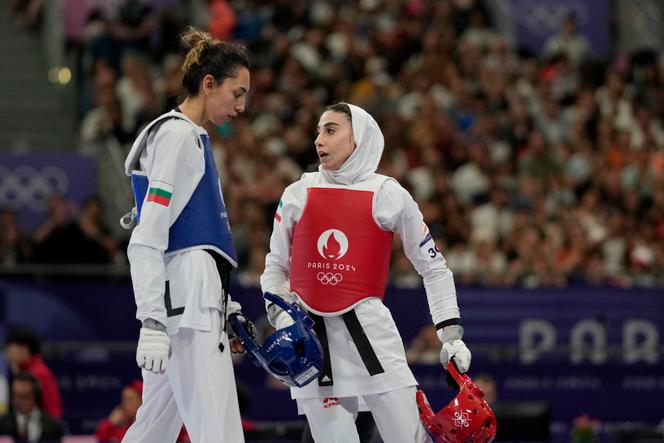


Until 2020, Kimia Alizadeh and Nahid Kiyani were close friends who motivated each other on the Iranian taekwondo team. But at the Olympic Games in Paris on Thursday, August 8, the two 26-year-old athletes met in the round of 16 in the under 57 kg category. Alizadeh, bareheaded, was playing for her adopted country of Bulgaria. With her hair covered by a headscarf, Kiyani was wearing the colors of the Islamic Republic of Iran, a country where the hijab is mandatory for women.
On Iranian television, which was broadcasting the competition live, the unease was palpable. How could they talk about Alizadeh, once much loved in Iran, especially for having become the first female Olympic medalist in her birth country's history in 2016, when she dared to leave four years later while criticizing the ruling power?
For journalists on Iranian television, the solution was to never mention Alizadeh's name throughout the event. Supporters of the regime lashed out violently at this "traitor" who, according to them, had taken advantage of Iranian money to grow as an athlete before turning her back on her homeland.
That's why, when Alizadeh was defeated by her former teammate, supporters of the Iranian regime gave free rein to their joy. The euphoria didn't last, however, as a few hours later, the two women found themselves back on the podium, in each other's arms. Kiyani took silver for Iran, and Alizadeh finished third. Their embrace lasted about 10 seconds, testifying to a friendship that remains unbroken, despite the distance and the risks run by the woman who will be returning to Iran. The scene was not shown on Iranian television, as the regime is always trying to erect a wall of hatred and fear between those who stay in the country and those who leave.
When she left Iran in 2020, Alizadeh explained her decision this way: "I'm one of the millions of oppressed women in Iran with whom [the rulers] had been playing as they wanted for years. I was wearing what they told me to. I repeated every sentence they ordered me to say. They attributed my medals to the [benefit of the] mandatory hijab and to their own management. In your patriarchal, misogynistic minds, you always thought Kimia was a voiceless woman. I have no demand in the world other than taekwondo, safety and a happy, healthy life." In this text, the Iranian athlete alluded to the message that the Supreme Leader, Ali Khamenei, had sent her after her victory at the Rio Olympics in 2016, congratulating her on having "shone while respecting the hijab."
You have 22.66% of this article left to read. The rest is for subscribers only.
